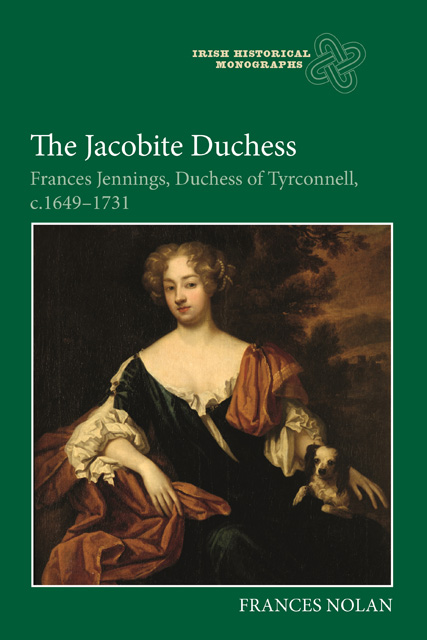Book contents
- Frontmatter
- Dedication
- Contents
- List of illustrations
- Acknowledgements
- List of abbreviations
- Notes on the text
- Introduction
- 1 ‘The malicious little gipsy’: Early life, c.1649–65
- 2 ‘Hambleton is now going into France’: Marriage, motherhood and migration, 1666–76
- 3 ‘Ruined beyond redemption’?: Widowhood, remarriage and returning, 1676–86
- 4 ‘That caballing humour’: A political woman, 1687–90
- 5 ‘Every one’s eye is watching’: Treason, forfeiture and exile, 1691–99
- 6 ‘Always a plane dealor’: Changing fortunes and life in the Low Countries, 1700–08
- 7 ‘A duchess-nun’?: Family, faith and finance in old age, 1708–30
- 8 ‘Albion’s fairest plant’: Death and legacy, 1731
- Appendix A: Duchess of Tyrconnell’s family tree
- Appendix B: Books in the possession of the duchess of Tyrconnell in Dublin, transported from her apartment in the Château de Saint-Germain-en-Laye
- Appendix C: David Nairne’s ‘Cyffer w[i]th the D[uche]sse of Tyrconnel, 5th August 1702’
- Bibliography
- Index
- Irish Historical Monographs previous volumes
3 - ‘Ruined beyond redemption’?: Widowhood, remarriage and returning, 1676–86
Published online by Cambridge University Press: 04 January 2024
- Frontmatter
- Dedication
- Contents
- List of illustrations
- Acknowledgements
- List of abbreviations
- Notes on the text
- Introduction
- 1 ‘The malicious little gipsy’: Early life, c.1649–65
- 2 ‘Hambleton is now going into France’: Marriage, motherhood and migration, 1666–76
- 3 ‘Ruined beyond redemption’?: Widowhood, remarriage and returning, 1676–86
- 4 ‘That caballing humour’: A political woman, 1687–90
- 5 ‘Every one’s eye is watching’: Treason, forfeiture and exile, 1691–99
- 6 ‘Always a plane dealor’: Changing fortunes and life in the Low Countries, 1700–08
- 7 ‘A duchess-nun’?: Family, faith and finance in old age, 1708–30
- 8 ‘Albion’s fairest plant’: Death and legacy, 1731
- Appendix A: Duchess of Tyrconnell’s family tree
- Appendix B: Books in the possession of the duchess of Tyrconnell in Dublin, transported from her apartment in the Château de Saint-Germain-en-Laye
- Appendix C: David Nairne’s ‘Cyffer w[i]th the D[uche]sse of Tyrconnel, 5th August 1702’
- Bibliography
- Index
- Irish Historical Monographs previous volumes
Summary
The death of George Hamilton on the Saverne on 1 June 1676 was mourned by many, including the French king. On 9 June the official historian to Louis XIV, Paul Pellisson-Fontanier, wrote from the French camp at Néer Hassel that
Amilton was generally regretted here, beginning with His Majesty. I have scarcely known any one on whose merits people were so agreed, or who was praised for such apparently contrasting qualities, that is to say, a great deal of gentleness, modesty, courage, boldness and firmness. He was highly esteemed by the late Monsieur de Turenne, and highly regarded in the troops. [With his death] the King has lost and knows it well.
The Irishman had acquitted himself bravely in his service to the French crown and showed much promise as an officer. No one suffered more in the aftermath of his death than Frances: as Pellisson-Fontanier noted, ‘his wife was spoken of … as reduced by his death to a deplorable condition, and without anything’. Shortly afterwards, the English ambassador to France, Lord Berkeley, reported that Frances was in the house of John Brisbane, secretary to the English embassy in Paris, and was ‘distracted for the loss of her husband’. Berkeley’s remarks suggest that the young woman bore her grief publicly, and this is echoed in the correspondence of Marie Rabutin-Chantal, marquise de Sévigné. On 1 July 1676 she reported to her daughter, Françoise, comtesse de Grignan, that ‘Madame Hamilton is inconsolable, and ruined beyond redemption; she really is to be pitied’. Less than a week later, de Sévigné commented again on ‘poor madame Hamilton’, who was ‘universally pitied on account of her melancholy situation’.
Accounts of the 27-year-old Frances Hamilton’s grief reveal a woman distraught over what she had lost, and over that which she might never have again: security. Frances had grown up in a family of reduced fortune, but familiarity did not make the prospect of penury any less affecting; if anything, it seems to have made it worse. Her sister Sarah’s ‘insecurity about money’ and ‘terror of debt and bankruptcy’ has been explained as ‘a fear of being beholden to others’, fuelled ‘by her wider sense that her life had been the property of others, that money alone freed her and her family from the vagaries of favour’.
- Type
- Chapter
- Information
- The Jacobite DuchessFrances Jennings, Duchess of Tyrconnell, c.1649-1731, pp. 60 - 84Publisher: Boydell & BrewerPrint publication year: 2021

